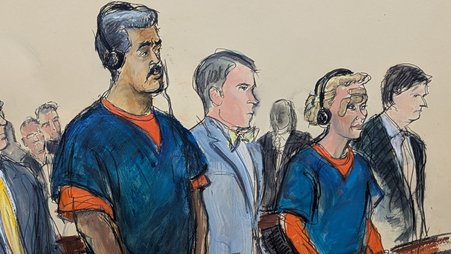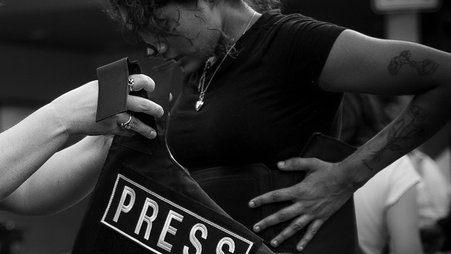Palestinian journalist Wael al-Dahdouh had already buried his wife, two children, and grandson, and been wounded himself when, on Jan. 7, 2024, his eldest son Hamza al-Dahdouh was killed by an Israeli airstrike in south Gaza. Hamza — a journalist, like his father — now appears on the grim list of the more than 80 journalists and media workers who, according to the Committee to Protect Journalists, have been killed since the Israel-Gaza war began.
Last week, Defending Rights & Dissent held a vigil outside the U.S. Capitol Building in Washington, D.C., to honor and remember those journalists. Freedom of the Press Foundation (FPF) co-sponsored the vigil, where speakers included Reps. Rashida Tlaib and Cori Bush, and journalist Townson Cocke.
More journalists have been killed in Gaza than in any other conflict since CPJ began keeping track of journalists’ deaths. At the vigil, Defending Rights & Dissent Policy Director Chip Gibbons acknowledged that covering war is dangerous; however, he noted that media and press freedom organizations have found evidence that the Israeli military has intentionally targeted journalists. And Israel has not committed to taking any steps to prevent inadvertent killings of journalists, despite news organizations’ attempts to clearly identify their reporters and inform the Israeli military of their locations.
In the face of these horrific deaths and apparent war crimes, the United States’ response has fallen shamefully short. Earlier this month, a coalition of leading press freedom and human rights organizations, including FPF, sent a letter to the Biden administration demanding that it do more to protect journalists’ ability to safely and freely report on the conflict.
At the vigil, FPF Deputy Advocacy Director Caitlin Vogus reiterated those calls. As Vogus explained, “Protecting journalists matters not only because all civilian life should be protected during wartime. It matters because protecting journalists also protects the world’s right to know about what’s happening in Gaza.”
Vogus also urged the Biden administration to allow the international press to enter Gaza independently of the Israeli military, so journalists can freely and fully report on the war. At a recent State Department briefing, spokesperson Matthew Miller refused to commit the U.S. to supporting independent journalists’ access to Gaza, stating only that it’s “not a decision for the United States to make.” It’s outrageous that the U.S. won’t even express support for international press access to Gaza, let alone do something about it.
As Rep. Bush explained at the vigil, “The role of a journalist, particularly in the face of conflict, is to capture the stories, the raw emotions, and the overlooked realities that often go unseen, unheard, untold. …. This role is significant when it comes to the journalists, particularly the Palestinian journalists, who set out to share the stories and perspectives of Palestinians.”
Added Rep. Tlaib: “The Israeli government’s brutal attacks have made Gaza the deadliest place in the world for journalists and their families. . . . We call on the international community, please come together to investigate the Israeli government’s war crimes for its repeated attacks on journalists.”
Finally, Cocke called on reporters to do more to tell the human stories of Palestinians in Gaza and offered to help connect reporters in the U.S. to sources in Gaza and other Palestinian communities.
Palestinian journalists deserve our protection and the world’s attention, Gibbons explained, quoting Wael al-Dahdouh, “We feel that we are being killed twice: once by the bombs and once by the silence.” Gibbons told the crowd at the vigil, “We are breaking that silence.”





